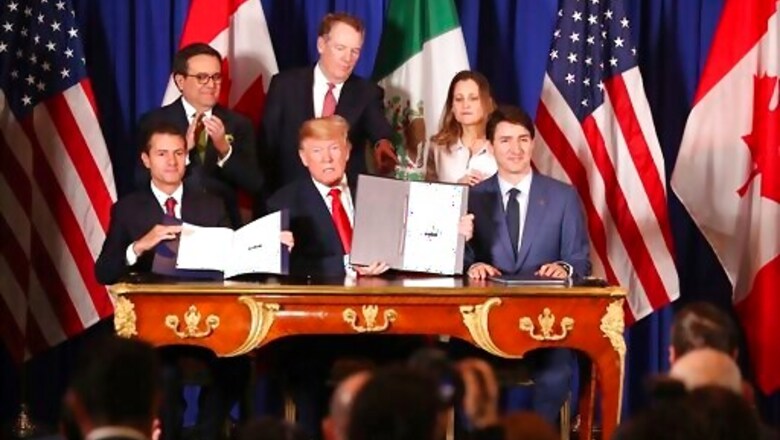
views
MEXICO CITY: The United States filed its first labor complaint with Mexico Wednesday under the U.S.-Mexico-Canada trade agreement, after an old-guard union was caught allegedly destroying ballots at a General Motors plant in northern Mexico.
The U.S. Trade Representative invoked the rapid response mechanism under the trade pact, known as the USMCA.
The mechanism allows a panel to determine whether Mexico is enforcing labor laws that allow workers to choose their union and vote on contracts and union leadership. If Mexico is found not to be enforcing its laws, sanctions could be invoked, including prohibiting some products from entering the United States.
Using USMCA to help protect freedom of association and collective bargaining rights in Mexico helps workers both at home and in Mexico, by stopping a race to the bottom, said U.S. Trade Representative Katherine Tai.
Mexican auto workers make one-eighth to one-tenth of the wages of their U.S. counterparts, something that has spurred a massive relocation of auto plants to Mexico and a loss of U.S. jobs.
For decades, corrupt Mexican unions signed low-wage “protection contracts behind workers backs, often before plants were even opened. Union votes were held by show of hands, or not at all. Workers at many factories in Mexico were unaware they even had a union until they saw dues deducted from their paychecks.
As part of efforts to get the USMCA, which replaced the old North American Free Trade Agreement, Mexico passed labor law reforms stating all union votes would be by secret ballot, and workers at all factories in Mexico could vote on whether to keep their current union.
It was one such vote among the 6,494 employees of GM transmission and pickup plants in the northern Mexico city of Silao in April that triggered the complaint.
Workers at the plant had been asked to vote yes or no on whether to recognize the union that has long controlled the plants labor contract. That union is part of the CTM, which formed part of the the party that ruled Mexico for most of the past century.
The Labor Department said that inspectors discovered that at the offices where the union itself had the ballot boxes, ballots that were part of the vote had been destroyed, making it impossible to continue with the vote.
Israel Cervantes, who helps lead the Generating Movement campaign to get a new union, and who was dismissed from the plant two years ago, said CTM union officials had broken open ballot boxes, destroyed no votes and replaced them with ballots marked yes.”
Cervantes said he was encouraged by the U.S. move, because this suggests that there won’t be more violations of workers’ rights.
In a statement Wednesday, GM said it supports the labor provisions of the USMCA, including rapid response, and said it will cooperate with authorities to guarantee the integrity of voting on the union contract at out manufacturing complex in Silao.
We do not think there was any involvement of General Motors in the alleged violations that occurred at our plants in Silao, GM said, but noted it had hired an outside consultant to conduct a review of what happened.
On Tuesday, Mexicos Labor Department declared the April vote invalid, citing serious irregularities, and ordered it be re-held within one month with extra security to avoid pressure from the company or the old union, to ensure workers that their vote will be peaceful, personal, free and secret.
Cervantes praised that decision, saying the (voting) process will be subject to better oversight than the April 21-22 vote, in which ballot boxes were kept at the old union’s offices.
Even Mexican President Andrs Manuel Lpez Obrador, who is notoriously sensitive about outside pressures, welcomed the USTR decision and said Mexico would respond.
It is a good thing, because the treaty before (NAFTA) did not take the labor situation into account, and now the treaty stipulates that employees have to receive fair wages and benefits, and moreover, choose their union representation freely and democratically, Lpez Obrador said.
Mexico is still in the middle of a process of holding votes at workplaces to accept or reject existing unions. The process started in 2019 and ends in 2023, and will have to be repeated at every unionized factory and workplace in Mexico.
Some experts have criticized the process, because employees are not allowed to choose between a new union and an old one. Instead, they are essentially asked to decide between the old union and none at all.
Labor Secretary Luisa Maria Alcalde has acknowledged it is an uphill battle because some union leaders havent gotten the message that they can no longer operate behind the backs of workers.
Fernando Salgado, the CTM assistant general secretary, did not respond directly to the accusations in April, but did say: We have had two fundamental values: equality and the respect we must show for freedom in union organizing.
When the old North American Free Trade Agreement was approved in 1994, leaders promised it would boost Mexicos wages, something that never happened, in part because of unrepresentative unions.
The USMCA includes some provisions to stem the flood of manufacturing jobs moving south, requiring that 40-45 percent of auto content be made by workers earning at least $16 per hour.
On Monday, a group of U.S. and Mexican unions filed their own labor complaint involving the Tridonex auto parts assembly plant in the Mexican border city of Matamoros, where workers have been fighting to join a new union.
The outside organizer of that union, lawyer Susana Prieto, has been jailed, harassed and prohibited from traveling to Tamaulipas, the state where Matamoros is located. She says about 600 workers at the Tridonex plant have been laid off in retaliation for supporting the new union.
Cardone, the U.S. company that operate the Tridonex plant, said in a statement that we do not believe that the allegations in the complaint are accurate and welcome a full inquiry so that the facts can be disclosed.
Disclaimer: This post has been auto-published from an agency feed without any modifications to the text and has not been reviewed by an editor
Read all the Latest News, Breaking News and Coronavirus News here. Follow us on Facebook, Twitter and Telegram.


















Comments
0 comment